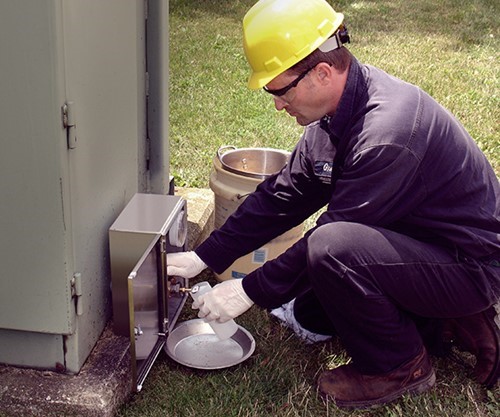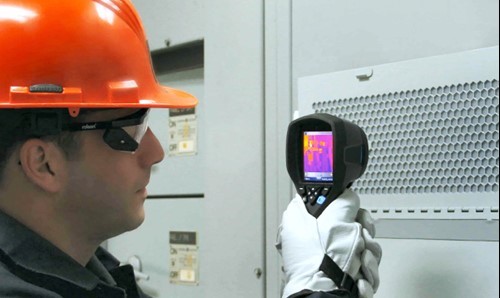News & Events

2 Ways to Avoid Hazards Without De-Energizing
Maintenance departments and facilities managers do everything possible to manage repairs, inspections, work orders, reliability concerns, and safety and compliance standards. These are all activities aimed at preventing outages and unplanned downtime. Because nobody likes downtime (unless you’re on vacation). For commercial and industrial operations, data centers, or production facilities, 100% uptime is what we want.
But downtime is unavoidable when it comes to some PM activities, right? Don’t we have to shut down equipment—especially high-voltage equipment like a transformer—when we work on them?
Not always.
Let’s discuss two ways to avoid electrical hazards without de-energizing your transformer.
#1: External Liquid Sampling
Opening a cabinet transformer door to pull a liquid sample creates an inherent safety risk that requires de-energizing your equipment or using bulky amounts of PPE—unless you have an external sampling device, like SampleSafe.

Remote sampling provides external liquid sampling access via a safe and secure enclosure installed on the outside of a cabinet transformer. No open door. No risk of electrical shock or arc flashes. Plus, with the cabinet door closed, transformers stay energized—keeping operations uninterrupted and technicians safe from electrical hazards.
Because the stakes are high with electric power maintenance, a device like SampleSafe can keep personnel safe during PM activities. We’ve seen firsthand how devastating and destructive electrical safety hazards can be when working on energized equipment. Studies of patients at burn centers have found that most patients reporting electrical burns were from injuries sustained while working. These workplace injuries can lead to significant replacement costs and liability claims for individuals and organizations involved in the incident.
The safest way to avoid these hazards altogether to obtain a liquid testing sample is through an external liquid sampling device. It provides quick, easy, and safe access through a secure enclosure installed on the outside of a cabinet transformer. No open door. No risk of arc flashes. Plus, with the cabinet door closed, transformers stay energized—keeping operations uninterrupted and technicians safe from electrical hazards.
#2: IR Windows
Avoiding or reducing exposure to dangerous conditions around energized equipment is often well within reach. A prime example is IR inspection windows, which provide increased safety, efficiency, and convenience.
Even non-contact inspection methods, such as infrared thermography, pose risks for technicians. Electrical shocks and arc flashes can happen any time transformer doors or breaker and switchgear panels are opened, and injuries sustained from the burns and the percussive injuries that occur as a result can be life-changing—even deadly. IR inspection windows eliminate the need for thermographers to open energized equipment, significantly reducing the risk to personnel.

Infrared thermography (IR scanning) is a non-contact inspection method that uses thermal imaging to detect high levels of heat, identify hot spots, and aid in early fault detection. By installing IR windows on your cabinet transformers, you can make IR scanning a practical part of your maintenance plan, prevent failures, and save time and money.
Stay Up and Running
Your transformers are critical to your facility’s uptime. Without it up and running, nothing else is up and running. Inspection tasks for electrical equipment can be dangerous, time-consuming, and expensive. And opening an energized cabinet transformer door for inspections increases the risk of electrical hazards and property damage. But it doesn’t have to be that way. With external liquid sampling devices and IR windows, routine PM activities can stay safe without causing downtime.
Contact a transformer specialist today to take the next step with SampleSafe or IR windows.
August 14, 2023
 Please wait while logging in.
Please wait while logging in.